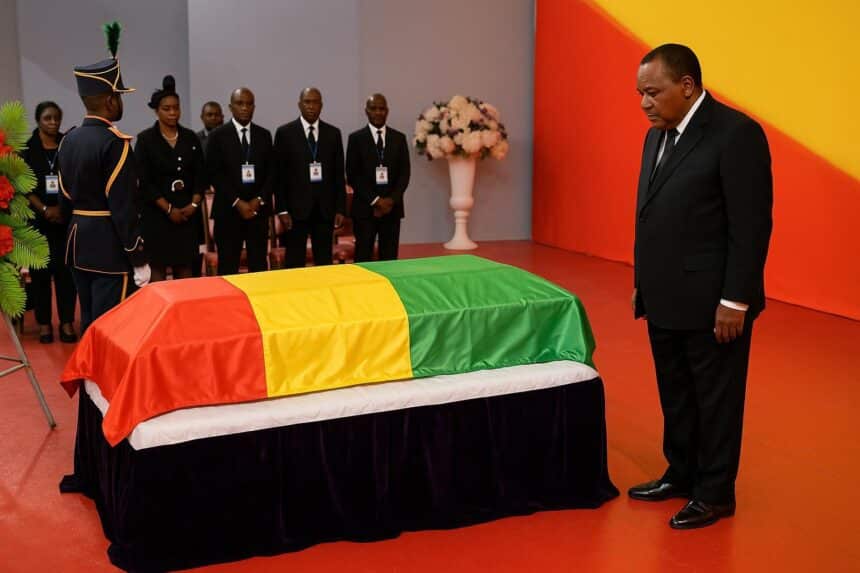Nation unites for a final goodbye
The soft morning light over the Palais des congrès could not mask the gravity inside the vast hall. Soldiers in ceremonial dress, parliamentarians and clergy stood shoulder to shoulder as the flag-draped coffin of André Georges Mouyabi entered to the roll of muffled drums.
President Denis Sassou Nguesso walked forward, placed a wreath of white roses on the casket and bowed his head for several seconds. The silence that followed, broken only by discreet sobs, illustrated how the country’s political families put differences aside to celebrate a life of public service (Les Dépêches de Brazzaville).
Outside, queues stretched along Avenue de la Paix. Many young people said they knew Mouyabi only through history lessons, yet felt compelled to attend. “We learn patriotism by example,” whispered Mireille, a 22-year-old student clutching a small national flag.
From Ditadi to the capital
Born in 1935 in Ditadi, Loudima district, Bouenza, Mouyabi grew up at a time when finishing primary school was already a feat. Scholarships took the inquisitive teenager to the Collège moderne de Dolisie, where teachers noted his quiet determination and love of debate, according to classmates contacted by local radio.
After secondary studies he joined the civil service, climbing the administrative ladder in the newly independent republic. The Bouenza accent remained, and he never hid his attachment to village life, frequently returning to assist in harvests or to sponsor student uniforms.
That rural grounding, analysts say, later informed many of his policy choices, especially in housing and civil-service reforms aimed at decentralizing opportunities beyond Brazzaville (ADIAC).
A young prefect in turbulent times
On 15 March 1965 the government appointed the 30-year-old Mouyabi as commissaire de gouvernement in Dolisie. Friends recall the excitement—and the tension—of managing rail strikes and budget shortages in a region still defining its post-colonial identity.
His reputation for patient listening caught the eye of national leaders. Less than fourteen months later he was elected president of the National Assembly, the youngest to hold the gavel since independence. Photographs from that era show him in a simple suit, refusing the chauffeur on many mornings.
The political crisis of 1968 forced the dissolution of parliament by President Alphonse Massamba-Débat. Mouyabi stepped down without public protest, telling reporters, “Institutions serve the nation; the nation never serves an institution.” That sentence remains quoted in university seminars.
Navigating heavyweight ministries
The 1970s and 1980s saw Mouyabi move across strategic portfolios—Industry and Mines, Urban Planning and Housing, then the Civil Service. Colleagues recount late-night meetings where he demanded plain-language reports and field visits before signing budgets.
When global commodity prices plunged, he pushed for local mineral processing to create jobs, a stance some economists now call ahead of its time. In Housing, he prioritized affordable cement distribution and micro-credit for self-build projects, earning quiet praise in peri-urban districts.
During the transition years of 1996-1997 he returned as special adviser to President Pascal Lissouba. Observers note his capacity to work with leaders across the spectrum without losing his image of discretion. “He argued firmly, never loudly,” recalls former cabinet director Jean-Bruno Itoua.
Farewell rituals and family bonds
The funeral oration, delivered by National Assembly first secretary Fernand Sabaye, traced this trajectory, pausing often to address Mouyabi’s ten children seated in the front row. Sabaye’s voice faltered while describing the late minister’s habit of correcting draft bills with a green pen.
After the ceremony the cortege left for Madingou, capital of Bouenza. Villagers lined the red-dust road, singing church hymns. Many carried cassava leaves and small lanterns, traditional symbols of guiding a soul home.
Burial is scheduled in the family compound overlooking the Loukoumi River. Elders explain that being laid to rest near ancestral mango trees fulfils an old vow Mouyabi made to his mother during his first days in office.
What today’s youth can learn
For Congolese under 35, Mouyabi’s career may feel remote, yet educators see teaching moments. Historian Sylvie Samba notes that he exemplified social mobility through education and public diligence—values resonant with current debates on unemployment and rural exodus.
At Université Marien-Ngouabi, students in political science organised a roundtable hours after the state homage. Themes included ethical leadership and the balance between loyalty and innovation within government structures.
On social networks, hashtags mixing French and Kituba thanked the late statesman for “showing that humility can walk with power”. The posts attracted thousands of likes, a revealing gauge of inter-generational dialogue.
A legacy of quiet conviction
Political commentators underline that Mouyabi never faced major scandal, a point repeatedly highlighted by state television coverage. In an era where trust in public office can waver, this spotless record feeds a broader conversation on governance.
The government’s communication service stressed that the homage matches the president’s call for “recognising the builders of our republic”. Analysts read the ceremony as affirmation of institutional continuity and respect for parliamentary history.
As night fell over Brazzaville, the national flag remained at half-mast. Church bells from Sainte-Anne tolled slowly, echoing across the Congo River. The sound carried the collective promise that the lessons of André Georges Mouyabi will not fade with the candles around his coffin.






















